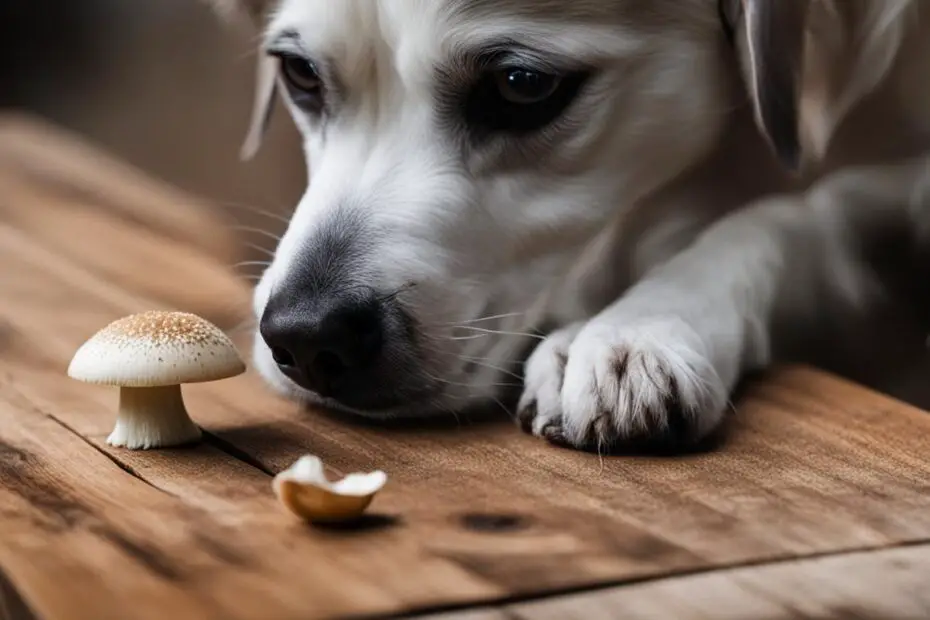When it comes to feeding our furry friends, it’s important to know which foods are safe for them and which ones to avoid. One question that often arises is whether dogs can eat white mushrooms. While mushrooms can be a nutritious addition to human diets, the same may not always hold true for our canine companions. Let’s explore the topic and find out if white mushrooms are safe for dogs to consume.
First and foremost, it’s crucial to understand that not all mushrooms are created equal. While some store-bought white mushrooms are safe for dogs to eat, caution must be exercised. It is best to feed your dog mushrooms that are organic, unseasoned, and uncooked.
However, it’s important to note that wild mushrooms should always be avoided as they can pose a significant danger to dogs. Identifying toxic mushrooms in the wild can be tricky, and ingesting them can result in serious health consequences for your furry friend.
If you suspect that your dog has consumed a wild mushroom, it is imperative to seek veterinary attention immediately. Timely intervention plays a crucial role in mitigating the risks associated with mushroom poisoning.
Key Takeaways:
- Not all mushrooms are safe for dogs to eat.
- White mushrooms bought from stores can be fed to dogs, but caution is advised.
- Wild mushrooms should always be avoided as they can be toxic.
- If you suspect your dog has ingested a wild mushroom, seek immediate veterinary care.
- Choosing the right mushrooms and ensuring their safety is essential for your furry friend’s well-being.
Types of Toxic Mushrooms for Dogs
When it comes to mushrooms, not all are safe for dogs. There are several types of toxic mushrooms that can have harmful effects on our furry friends. It’s important for dog owners to be aware of these mushrooms to ensure the well-being of their pets.
Here are some of the most common toxic mushroom species:
- Amanita phalloides (Death Cap)
- Galerina marginata (Deadly Galerina)
- Amanita muscaria (Fly Agaric)
- Gyromitra spp. (False Morel)
- Inocybe spp.
- Clitocybe dealbata
These mushrooms can cause severe symptoms if ingested by dogs, including gastrointestinal upset, liver or kidney failure, seizures, tremors, hallucinations, excessive drooling, and more. It is crucial to avoid these toxic white mushrooms to keep your dog safe and healthy.
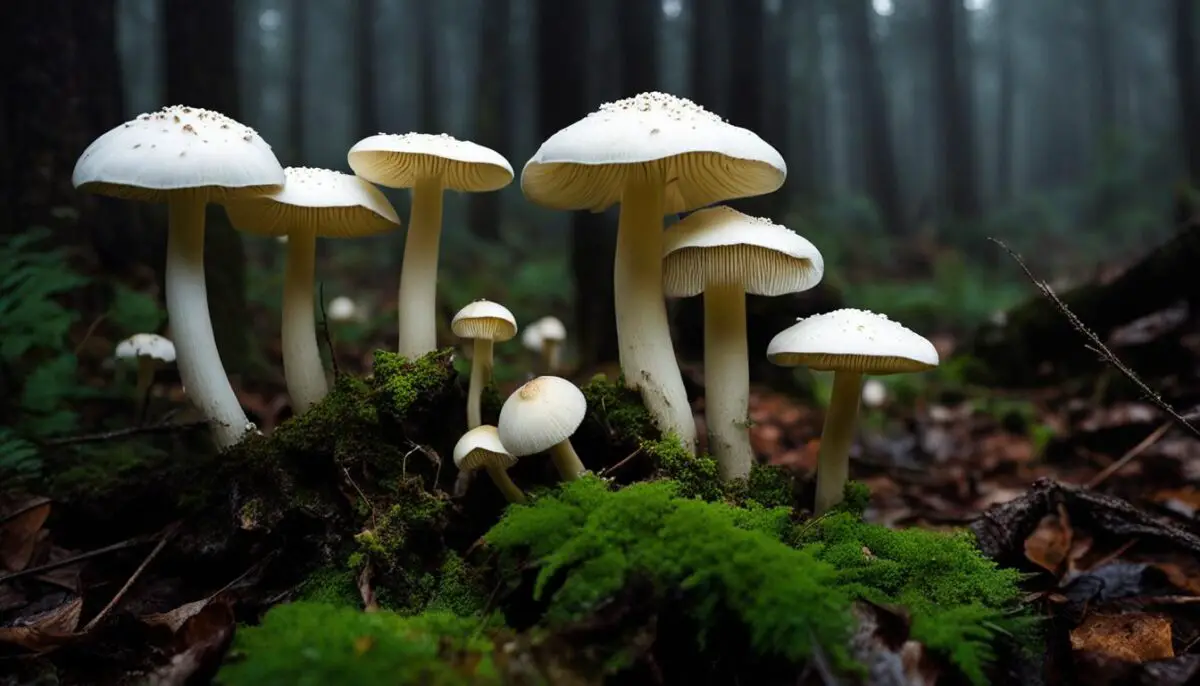
Symptoms of Mushroom Poisoning in Dogs
The health risks of dogs eating white mushrooms or consuming any toxic mushrooms can be severe. It’s crucial for dog owners to be aware of the dangers associated with dogs consuming white mushrooms. Understanding the symptoms of mushroom poisoning in dogs can help you identify any potential issues early and seek appropriate veterinary care.
The symptoms of mushroom poisoning in dogs can vary depending on the species of mushroom ingested. Some common symptoms to watch out for include:
- Gastrointestinal upset: Dogs may experience stomach discomfort, nausea, vomiting, and diarrhea.
- Sedation: Dogs may appear lethargic, drowsy, or have a decreased level of consciousness.
- Tremors: Dogs may exhibit involuntary muscle movements, shaking, or trembling.
- Seizures: Dogs may experience convulsions or seizures, which can be a serious and life-threatening symptom.
- Drooling: Dogs may have excessive salivation or drooling.
- Excessive urination: Dogs may have increased frequency and volume of urination.
- Diarrhea and vomiting: Dogs may experience diarrhea and/or vomiting.
- Tearing from the eyes: Dogs may have excessive tearing or watery eyes.
The severity of the symptoms can vary based on factors such as the specific mushroom species, the amount ingested, the overall health of the dog, and any pre-existing conditions. Additionally, the combination of ingested substances can further complicate the symptoms.
If you notice any of these symptoms in your dog and suspect mushroom poisoning, it is essential to seek immediate veterinary care. Prompt treatment can make a significant difference in the outcome and help prevent further health complications.
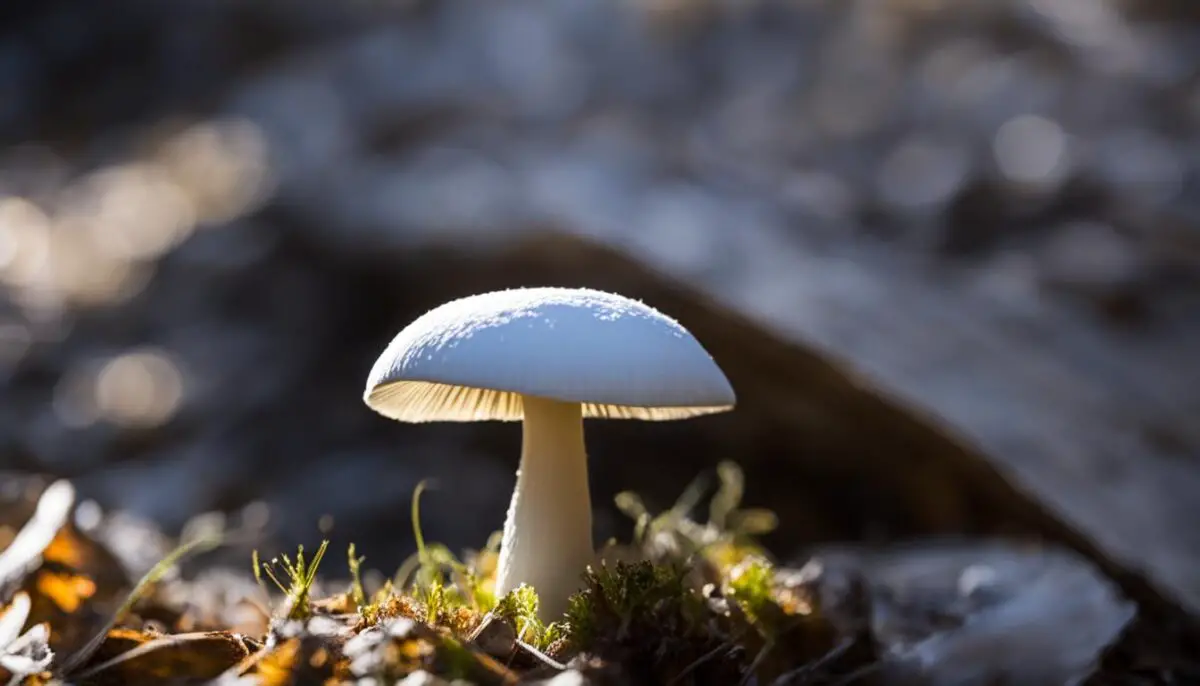
Remember, prevention is always better than cure. It’s crucial to ensure that your dog does not have access to white mushrooms or any wild mushrooms. Monitoring your dog during walks or outdoor activities, dog-proofing your yard, and educating yourself about mushroom identification can help keep your furry friend safe from the dangers of mushroom poisoning.
Treatment for Mushroom Poisoning in Dogs
The veterinary treatment for mushroom poisoning in dogs depends on the type of mushroom, the symptoms, and the timing of ingestion. If you suspect that your dog has ingested a toxic mushroom, it is crucial to seek immediate professional help from a veterinarian. Here are some common steps involved in treating mushroom poisoning in dogs:
- Identification: If possible, bring a sample of the mushroom to your veterinarian for identification. Knowing the specific mushroom species can help guide the treatment process.
- Inducing Vomiting: In some cases, the veterinarian may induce vomiting to remove the toxic substances from the dog’s stomach. It is important to note that inducing vomiting should only be done under professional supervision.
- Administering Medications: Depending on the severity of the poisoning, the veterinarian may prescribe medications to counteract the toxin and prevent further absorption in the body.
- Providing Supportive Care: Supportive care is essential in managing the symptoms and helping the dog recover. This may include intravenous fluids to maintain hydration, medications to control seizures or tremors, and other supportive treatments as needed.
- Monitoring and Observation: Dogs affected by mushroom poisoning often require close monitoring to evaluate their condition, track any changes in symptoms, and make any necessary adjustments to the treatment plan.
Mushroom Poisoning Treatment Process
“The treatment for mushroom poisoning in dogs involves a combination of identification, inducing vomiting, administering medications, providing supportive care, and continuous monitoring to ensure the dog’s recovery.”
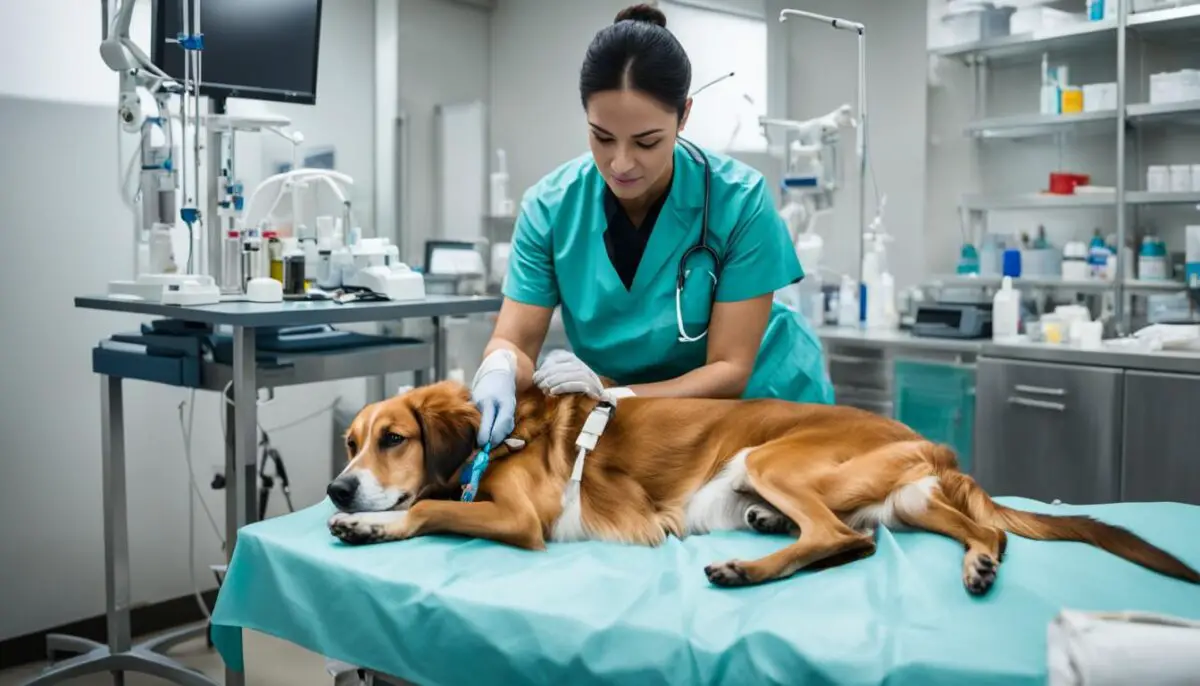
It is important to note that mushroom poisoning in dogs is a serious condition that should not be treated at home. Prompt veterinary intervention is vital for the best possible outcome. Remember to always keep a close eye on your dog and prevent their access to potentially toxic mushrooms.
Safe Mushroom Options for Dogs
While some mushrooms are toxic to dogs, there are safe options that can be included in their diet. Mushrooms such as shiitake, portobello, and white button mushrooms that are bought from stores or grown in your garden are generally safe for dogs. However, it is important to serve them plain and avoid adding any seasonings, oils, butter, garlic, or onions as these ingredients can be harmful to dogs. It’s always best to consult with your veterinarian before incorporating mushrooms into your dog’s diet.
Mushrooms can provide a variety of health benefits for dogs, including:
- Rich in vitamins and minerals essential for their overall well-being.
- Source of dietary fiber for improved digestion.
- Natural antioxidants that support a healthy immune system.
- Low in fat and calories, making them a healthy treat option.
“Including safe mushrooms in your dog’s diet can add nutritional value and provide a tasty snack. Just remember to keep it plain and consult with your vet to ensure it aligns with your dog’s specific dietary needs.” – Dr. Sarah Stevens, Veterinarian
Here’s a comparison table highlighting the nutritional content of different safe mushrooms:
| Mushroom Variety | Calories (per 100g) | Protein (g) | Fat (g) | Carbohydrates (g) | Fiber (g) |
|---|---|---|---|---|---|
| Shiitake | 34 | 2.2 | 0.5 | 6.8 | 2.5 |
| Portobello | 22 | 3.1 | 0.3 | 4.6 | 1.6 |
| White Button | 14 | 1.6 | 0.2 | 2.4 | 0.7 |
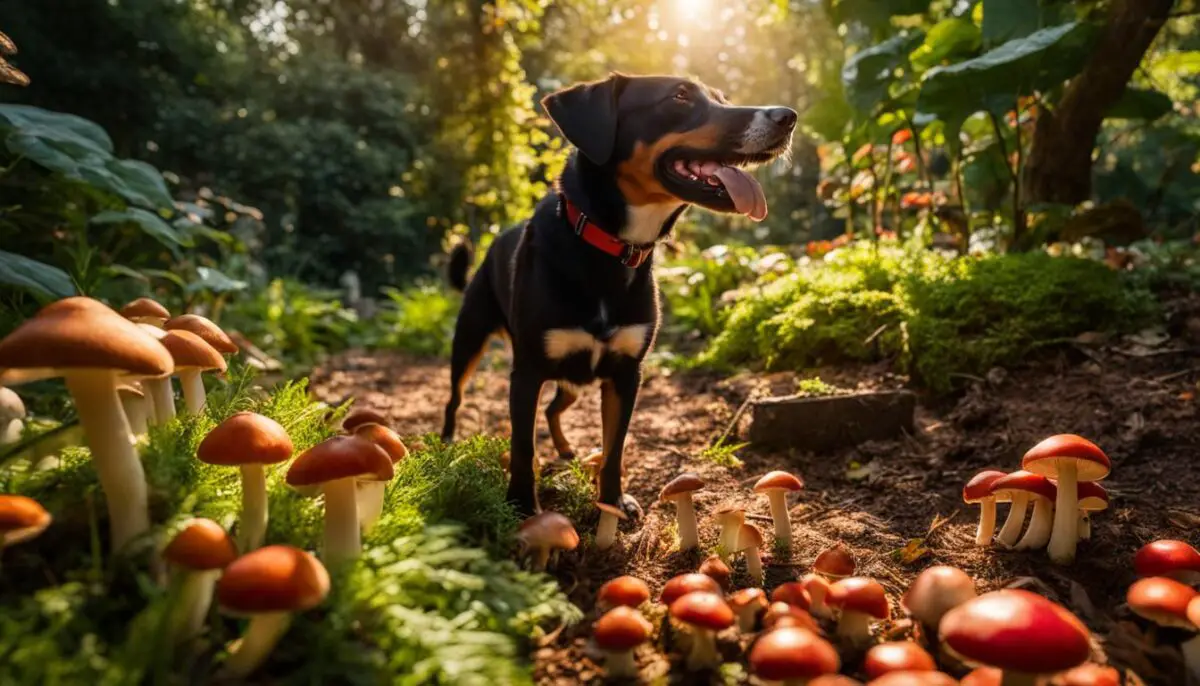
Keep in mind that every dog is unique, and their dietary needs may vary. Monitoring your dog’s reaction to mushrooms is important. If you notice any digestive issues or allergic reactions, discontinue feeding mushrooms and consult your veterinarian.
Preventing Mushroom Poisoning in Dogs
To prevent mushroom poisoning in dogs, it is essential to keep a close eye on them during walks or in the yard, especially if they like to explore and eat things from the ground. Here are some tips to help you protect your furry friend:
- Dog-proof your yard: Make sure your yard is free of potentially toxic plants, including mushrooms. Regularly inspect your garden and remove any mushrooms that may have sprouted.
- Keep your dog on a leash: When hiking or walking in wooded areas, always keep your dog on a leash. This prevents them from consuming unknown mushrooms that could be toxic.
- Consult experts: If you come across wild mushrooms growing in your area, seek the help of experts in mushroom identification and removal. They can assess the mushrooms and advise you on the potential risks.
By following these precautions, you can significantly reduce the chances of your dog ingesting harmful mushrooms and experiencing mushroom poisoning.
Conclusion: White Mushrooms and Dogs – Understanding the Dangers
In conclusion, while white mushrooms can be a safe addition to your dog’s diet when purchased from a store or grown in your garden, it is crucial to be cautious, especially when it comes to wild mushrooms. Toxic mushrooms pose a serious risk to your furry friend’s health and can lead to various symptoms ranging from gastrointestinal upset to organ failure.
If you suspect your dog has ingested any mushrooms or shows signs of mushroom poisoning, such as vomiting, diarrhea, or excessive drooling, it is important to contact your veterinarian immediately. The sooner your dog receives professional care, the better their chances of a full recovery.
Remember, prevention is key when it comes to keeping your dog safe from mushroom toxicity. Keep a close eye on your dog during walks or in the yard, and dog-proof your outdoor areas to reduce the risk of exposure to toxic plants and mushrooms. When hiking in wooded areas, ensure your dog is on a leash to prevent them from eating unknown mushrooms.
Your dog’s health and well-being should always be a top priority. By understanding the dangers associated with white mushrooms and taking necessary precautions, you can ensure that your four-legged companion stays happy and healthy.
FAQ
Can dogs eat white mushrooms?
Dogs can eat mushrooms bought from a supermarket or shop, preferably organic, unseasoned, and raw. However, they should always avoid any wild mushrooms as they can be toxic.
Are white mushrooms safe for dogs?
White mushrooms bought from stores or grown in your garden, such as shiitake, portobello, and white button mushrooms, are generally safe for dogs. However, they should be served plain without any seasonings, oils, butter, garlic, or onions.
What are the types of toxic mushrooms for dogs?
The most common toxic mushroom species for dogs include Amanita phalloides (death cap), Galerina marginata (deadly Galerina), Amanita muscaria (fly agaric), Gyromitra spp. (false morel), Inocybe spp., and Clitocybe dealbata.
What are the symptoms of mushroom poisoning in dogs?
Symptoms of mushroom poisoning in dogs can include gastrointestinal upset, sedation, tremors, seizures, drooling, excessive urination, diarrhea, vomiting, and tearing from the eyes.
How is mushroom poisoning in dogs treated?
Veterinary treatment for mushroom poisoning depends on the type of mushroom, symptoms, and timing of ingestion. It may involve inducing vomiting, administering drugs to counteract the toxin, providing supportive care, and monitoring the dog’s condition until they recover.
Can dogs include mushrooms in their diet?
Dogs can include safe mushrooms such as shiitake, portobello, and white button mushrooms in their diet. However, it’s best to consult with your veterinarian before incorporating mushrooms into their diet.
How can mushroom poisoning in dogs be prevented?
To prevent mushroom poisoning, keep a close eye on your dog during walks or in the yard, dog-proof your yard to remove potentially toxic plants, and keep your dog on a leash while hiking in wooded areas.
What should I do if my dog eats mushrooms or shows signs of mushroom poisoning?
If your dog ingests mushrooms or exhibits signs of mushroom poisoning, contact your veterinarian immediately for professional assistance. It is important to seek veterinary care as mushroom poisoning cannot be treated at home.
